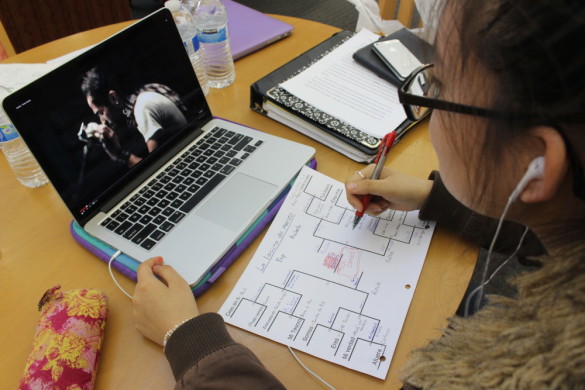Michelle Lee (’16) listens to one of the two Spanish songs to complete her bracket.By Heather Kim and Carolyn Nguyen, Staff Writers
Spanish students compete against their peers in “La Locura de Marzo,” a game created by Spanish teacher James Diecidue.
Basketball isn’t the only thing March Madness is known for. “La Locura de Marzo” or March Madness has the same concept of the actual March Madness— only replacing basketball teams with Spanish songs.
Each student gets a bracket or paper with several Spanish songs arranged in a specific order. They listen to two songs and choose between their favorite one. The winning song gets to go up against another song that they chose.
In the end, the top two songs get to compete for the final spot and wins as the class favorite, as well as March Madness as a whole.
“La Locura de Marzo” was first brought up by Diecidue over lunch one day with Spanish teacher Holly Vivar.
“Mr. Diecidue came up with the idea,” said Vivar. “He had seen another teacher in some other school tweet about it and said it was a cool idea to incorporate Spanish with the idea of March Madness.”
Diecidue started to make the bracket while Vivar picked the songs and made a playlist from all genres of music like pop, rock, etc.
“We wanted to include different genres of music on the bracket itself because we really wanted to expose students to different genres,” said Vivar. “…and maybe see if they’re more interested in others and to see if they found something new that they enjoy.”
Students wondered if “La Locura de Marzo” was just a fun activity not serving any educational purposes, but Mrs. Vivar begs to differ.
“I do think March Madness helps students,” says Vivar, “And to be honest, I didn’t expect the response that we’ve gotten and so far it’s been a really positive response from all the students in my classes.”
Diecidue and Vivar note that students have been more excited and come into class asking each other what their favorite songs were and what they chose as the winning song.
“I think that just exposure to songs in Spanish sometimes really has the ability to help us understand a language better and it’s culture in a new way,” said Vivar. “Especially if you’re singing along to the songs, the fluidity of music; that helps with pronunciation.”






